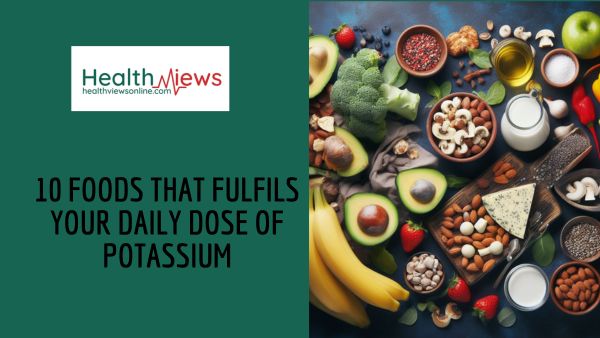Potassium is a mineral that the body needs for a range of functions. Because the body cannot generate potassium, it must be obtained through diet. However, the majority of people do not consume enough potassium. This is due primarily to a shortage of fruits and vegetables in the average diet.
It is suggested that healthy persons consume 4,700 mg per day. Getting adequate potassium in your diet is critical for bone and heart health. It is essential for those with high blood pressure, and it may reduce the risk of heart disease and stroke. (Source)
Also, Read All about Volumetric Diet: A Detailed Guide on Volumetric Diet for Beginners!
This article includes the top ten potassium-rich foods that fulfil your daily dose of Potassium
1. White Beans
Lentils and beans are both high in potassium. White beans are one of the best sources of potassium, with 421 mg per 1/2 cup (130 grams). White beans are high in fiber and contain a considerable amount of potassium per serving.
Consuming fiber-rich meals such as white beans reduces your chances of diabetes and heart disease while also boosting weight loss.
2. Potatoes and sweet potatoes
White potatoes are one of the best potassium-rich foods available. A large baked potato (299 g) contains 1,600 mg.
It is best to eat potatoes cleaned and unpeeled because potassium is present in both the potato’s flesh and skin. Baked sweet potatoes are another potassium-rich starchy tuber. 1,110 milligrams are present in one of these huge vegetables (235 grams). However, potatoes provide more than simply potassium. They also contain manganese, vitamins A, C, and B6.
Also, watch health views web stories: 8 Foods That Fulfill Your Vitamin A Dose
3. Beets
Beets come in a variety of colors, including dark red, purple, and white. This root vegetable has a sweet flavor by nature. The amount of potassium in sliced and boiled beets is 259 mg per 1/2 cup (85 grams). Beets are also a good source of manganese and folate. Additionally, the antioxidant function of the pigment that gives beets their deep color may aid in the battle against oxidative damage and inflammation.
Nitrates, which are abundant in beets, may help blood vessel function, high blood pressure, and exercise performance.
4. Parsnips
Parsnips are a white root vegetable that resembles carrots. One cup of parsnips (160 grams) has 570 milligrams of potassium. Parsnips are also high in vitamin C and folate, which are necessary for skin and tissue health, cell division, and fetal growth and development. Furthermore, the soluble fiber present in parsnips may help lower cholesterol levels.
5. Spinach
Spinach is a high-nutritional vegetable. Cooked spinach, which has 839 mg of potassium per cup, is a wonderful alternative for people looking to enhance their intake. It also contains approximately four times the RDI for vitamin A, ten times the RDI for vitamin K, about a quarter of the RDI for calcium, and nearly 85% of the RDI for manganese. These nutrients are essential for metabolism, eye health, bone health, and immune system function.
6. Tomato sauce
Tomatoes and tomato products like tomato sauce are high in potassium. One cup of tomato sauce (245 grams) provides 728 milligrams of potassium.
Tomatoes are also high in minerals like manganese and vitamins like A, C, E, and B6. Furthermore, tomatoes contain beneficial plant chemicals such as lycopene, which may help combat inflammation and reduce the risk of prostate cancer.
7. Oranges and orange juice
Citrus fruits, such as oranges, are well recognized for their high vitamin C content, but they are also a strong source of potassium. One cup (248 g) of orange juice has 496 mg of potassium. It also contains a lot of folate, vitamin A, thiamine, and antioxidants.
Furthermore, drinking calcium and vitamin D-fortified orange juice may assist in promoting bone health, especially since high potassium consumption may benefit bone health.
Also, Read Complete Guide on Walnut: Health Benefits, Nutrition Profile, Facts
8. Bananas
Bananas are known to be high in potassium. One banana contains 451 milligrams of potassium. This delicious fruit is also high in vitamin C, B6, magnesium, fiber, and antioxidants. Because of its convenient, natural packaging, bananas are an easy and healthful method to enhance your potassium intake while on the road.
9. Avocados
Avocados are extremely nutritious, flavorful, and one-of-a-kind. They’re strong in monounsaturated fats, which are good for your heart, as well as fiber, antioxidants, vitamins C, K, and B6, folate, and pantothenic acid.
Avocados are high in potassium as well. One cup (150 g) of mashed avocado has 1120 milligrams of potassium.
10. Yoghurt
Yogurt is high in calcium, riboflavin, and potassium. This creamy delight contains 380 mg of potassium per cup (245 grams).
When purchasing yogurt, choose plain varieties over fruit-flavored varieties because fruit-flavored yogurts typically include a lot of added sugar. If plain yogurt is too tart for you, sweeten it with fresh fruit, almonds, honey, or maple syrup.
Most people do not drink enough potassium, which may be linked to poor health consequences. The ten foods in this list are excellent sources of potassium. Choosing whole foods like fruits, vegetables, dairy, and legumes is a healthy and delightful approach to boost your potassium intake.
Also, watch health views web stories: 8 FOODS THAT FULFILL YOUR VITAMIN C DOSE





